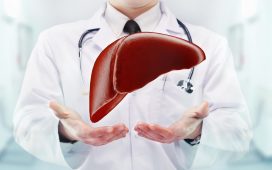Here are what the editors at HealthDay consider to be the most important developments in Radiology for March 2018. This roundup includes the latest research news from journal articles, as well as the FDA approvals and regulatory changes that are the most likely to affect clinical practice.
Relapse in Major Depression Linked to Brain Cortical Changes
THURSDAY, March 29, 2018 (HealthDay News) — For patients with major depressive disorder (MDD), relapse is associated with brain cortical changes over two years, according to a study published online March 28 in JAMA Psychiatry.
Novel Interstitium Has Been Identified in Human Tissues
THURSDAY, March 29, 2018 (HealthDay News) — A previously unrecognized interstitium has been identified in human tissues, according to a study published online March 27 in Scientific Reports.
EHR Usability Contributes to Possible Patient Harm Events
TUESDAY, March 27, 2018 (HealthDay News) — Electronic health record (EHR) usability may contribute to possible patient harm events, according to a research letter published in the March 27 issue of the Journal of the American Medical Association.
Children’s Hoverboard, Skateboard Injuries Are Similar
TUESDAY, March 27, 2018 (HealthDay News) — Injury characteristics among hoverboard riders and skateboarders are similar, according to a study published online March 26 in Pediatrics.
Ethical Duties ID’d for Short-Term Global Health Experiences
MONDAY, March 26, 2018 (HealthDay News) — In a position paper published online March 27 in the Annals of Internal Medicine, ethical obligations have been detailed for physicians participating in short-term global health experiences (STEGHs).
Lean Approach May Help Tackle Burnout in Health Care Providers
FRIDAY, March 23, 2018 (HealthDay News) — The Lean approach, which emphasizes reducing waste and improving customer value by focusing on the big picture, can be used to address physician burnout, according to a report published in Medical Economics.
Unique Risks Associated With Texting Medical Orders
THURSDAY, March 22, 2018 (HealthDay News) — Despite the popularity, convenience, and speed of texting medical orders, there are unique and alarming risks associated with the practice, according to a report published in Drug Topics.
Hormone Therapy May Impact Brain Structure, Cognition
WEDNESDAY, March 21, 2018 (HealthDay News) — Taking menopausal hormone therapy may have long-term effects on the brain, according to a study published online March 21 in Neurology.
Blueprint Being Developed to Address Physician Burnout
WEDNESDAY, March 21, 2018 (HealthDay News) — A new, three-pronged approach is being applied to develop a blueprint for addressing physician burnout, according to a report published in Medical Economics.
Personal Health Info Found in Recycling at Five Hospitals
TUESDAY, March 20, 2018 (HealthDay News) — A considerable amount of personal health information (PHI) and personally identifiable information (PII) was found in the recycling at five Canadian teaching hospitals, according to a research letter published in the March 20 issue of the Journal of the American Medical Association.
Abstract/Full Text (subscription or payment nay be required)
Prior Authorization Negatively Impacts Clinical Outcomes
MONDAY, March 19, 2018 (HealthDay News) — The burdens associated with prior authorization (PA) are high and include a negative impact on clinical outcomes, reported by 92 percent of physicians, according to the results of a survey conducted for the American Medical Association (AMA).
Survey
Altered Neural Responses in Memory Processing in T1DM
MONDAY, March 19, 2018 (HealthDay News) — Young adults with type 1 diabetes have altered neural responses during working memory processing, according to a study published online March 12 in Diabetes.
Dose-Escalated Radn Does Not Up Survival in Localized Prostate CA
FRIDAY, March 16, 2018 (HealthDay News) — Dose escalation from 70.2 to 79.2 Gy is not associated with improved overall survival (OS) in intermediate-risk prostate cancer, according to a study published online March 15 in JAMA Oncology.
Reduced Cortical Thickness ID’d in Obstructive Sleep Apnea
FRIDAY, March 16, 2018 (HealthDay News) — Reduced cortical thickness is seen in individuals with obstructive sleep apnea (OSA) versus controls, with multiple regions of reduced thickness seen in the superior frontal lobe in females with OSA, according to a study published online March 6 in PLOS ONE.
No Benefit for MRI After Normal Cervical CT in Blunt Trauma
FRIDAY, March 16, 2018 (HealthDay News) — For patients with obtunded blunt trauma to the cervical spine, magnetic resonance imaging (MRI) follow-up appears not to be beneficial after normal cervical computed tomography (CT) findings, according to a study published online March 14 in JAMA Surgery.
Editorial (subscription or payment may be required)
Hep C Compounds Alcoholism’s Effect on Brain Volume
FRIDAY, March 16, 2018 (HealthDay News) — Alcohol dependence has deleterious effects on frontal cortical volumes that are compounded by hepatitis C virus (HCV) infection and drug dependence, according to a study published online March 14 in JAMA Psychiatry.
Editorial (subscription or payment may be required)
Head Injury Outcomes Better With Trauma Center Care
TUESDAY, March 13, 2018 (HealthDay News) — Patients with isolated, severe head injury have better outcomes if they are initially treated in designated trauma centers, according to a study published online March 1 in the Journal of the American College of Surgeons.
U.S. Spends Twice As Much for Similar Health Care Utilization
TUESDAY, March 13, 2018 (HealthDay News) — Spending on health care is much higher in the United States than other high-income countries, but utilization rates are similar, according to a study published in the March 13 issue of the Journal of the American Medical Association.
Editorial 1 (subscription or payment may be required)
Editorial 2 (subscription or payment may be required)
Editorial 3 (subscription or payment may be required)
Editorial 4 (subscription or payment may be required)
Excessive Daytime Sleepiness Tied to Increased β-Amyloid
TUESDAY, March 13, 2018 (HealthDay News) — Baseline excessive daytime sleepiness (EDS) is associated with increased β-amyloid (Aβ) accumulation in elderly individuals without dementia, according to a study published online March 12 in JAMA Neurology.
Editorial (subscription or payment may be required)
Bronchial Thermoplasty Can Improve Severe Asthmatic Cough
TUESDAY, March 13, 2018 (HealthDay News) — Bronchial thermoplasty can treat severe asthmatic cough that is unresponsive to conventional therapies, according to a case report published online March 13 in the Annals of Internal Medicine.
Racial Variation in Median Age of Female Breast Cancer Diagnosis
MONDAY, March 12, 2018 (HealthDay News) — The median age of diagnosis of female breast cancer is higher for white patients than for black, Hispanic, and Asian patients, according to a research letter published online March 7 in JAMA Surgery.
Three-Pronged Approach Can Improve Physician Engagement
MONDAY, March 12, 2018 (HealthDay News) — The three-pronged approach implemented by one practice successfully improved physician engagement, according to an article published in Medical Economics.
Median Household Income Predicts Survival in Anal Cancer
MONDAY, March 12, 2018 (HealthDay News) — Lower median household income (MHI) is associated with worse survival for patients with squamous cell carcinoma of the anus (SCCA), according to a study published online March 12 in Cancer.
Full Text (subscription or payment may be required)
Falls in Elderly Patients Cost $50 Billion Annually
FRIDAY, March 9, 2018 (HealthDay News) — Older adult falls result in substantial medical costs, according to a study published online March 7 in the Journal of the American Geriatrics Society.
Most Women Willing to Trade Off Benefits, Risks of Breast Screening
THURSDAY, March 8, 2018 (HealthDay News) — On average, women are willing to accept some additional unnecessary follow-ups and costs for additional cancer detection, although there is considerable heterogeneity in preferences for screening, according to a study published in the February issue of Value in Health.
Copyright © 2018 ScoutNews, LLC. All rights reserved.







